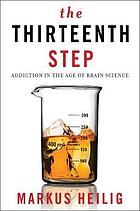
The Thirteenth Step
Addiction in the Age of Brain Science
اعتیاد در عصر علوم مغز:
کتاب های مرتبط
- اطلاعات
- نقد و بررسی
- دیدگاه کاربران
نقد و بررسی

March 15, 2015
Heilig sums up what he has learned during his 20 years as a physician and researcher in the treatment of alcohol and other addictive disorders. The author is a specialist in the field of neuropsychopharmacology, and he has treated patients and directed research for two decades in the United States and Sweden. Heilig subscribes to the view that "addiction is inherently a chronic, relapsing disease, not much different from...hypertension, diabetes, or asthma," which, while not curable, can be successfully managed so that sufferers can lead productive lives. Continued abuse of an addictive substance creates transformations in the brain that create a physiologically based need for the drug in order to avoid the pain of withdrawal as well as the necessity of taking a higher dose to experience pleasure. Environmental factors such as stress can trigger recurring drinking bouts, even in cases where patients have not ingested alcohol for a sustained period and no longer suffer from symptoms of withdrawal. The author also examines the genetic component of addiction. In the case of drinking, it is connected to the ability of alcoholics to get pleasurably drunk without experiencing immediate negative consequences such as nausea, dizziness, or blackout. While there is consensus within the medical community that alcoholism is a disease, its chronic nature is not yet sufficiently recognized and requires continued medical intervention. Heilig reports on his own research, which involves studying how the brain's neural circuitry is hijacked by addictive substances that trigger the release of high doses of the neurotransmitter dopamine, which creates the perception of pleasure. His aim is to develop counteractive drugs that have minimal side effects. Heilig writes compassionately of the problems of patients caught in the grip of addiction whose lives often spiral out of control despite their struggle to remain sober. There are "two perspectives" he writes,"of science and humanism," which "are inseparable in any area of medicine, but perhaps most so in psychiatry and addiction medicine." An informative and compassionate chronicle of Heilig's own growth as a physician and researcher.

April 1, 2015
Physician scientist Heilig (clinical director, National Inst. on Alcohol Abuse and Alcoholism at the National Insts. of Health; fellow, American Coll. of Neuropsychopharmacology) argues that the science of addiction has relied on outdated treatment methods and that most patients with this disease receive the same type of archaic care. The material, which is written for laypeople and practitioners, is well organized with copious references citing scientific studies. Heilig discusses the latest treatments that practitioners should give to their patients so a relapse doesn't occur and explains the neurology of the condition in detail. Additionally, the author highlights the main points from stories of patients from various walks of life and the emotional effects addiction has on family and friends. He clarifies beliefs that people may have about addiction sufferers and humanizes individual experiences by sharing thoughtful and sensitive treatment advice and accounts. VERDICT This title is recommended for anyone who suffers from addiction or who knows someone who does; undergraduate and graduate students, scholars, and researchers studying medicine, particularly addiction and neurology, and psychology; and anyone who has an interest in learning more about the subject.--Tina Chan, SUNY Oswego
Copyright 2015 Library Journal, LLC Used with permission.

























دیدگاه کاربران